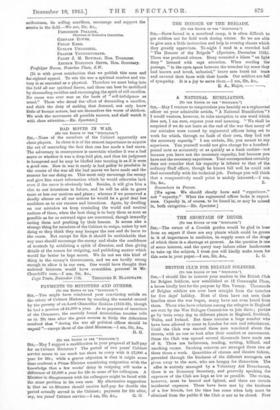BRITISH CLUB FOR BELGIAN SOLDIERS.
[To mna EDITOR OF mm " firacreroa."] SIR, I should like to interest your readers in the British Club for Belgian Soldiers, now established at 12 Connaught Place, a house kindly lent for the purpose by Mrs. Verney. Thousands of Belgian soldiers are over here straight from the trenches for five days' holiday. Most of them have not seen their families since the war began, many have not even heard from them. Those who have relations among the refugees in England are sent by the War Refugee Commit tee to join them ; parties go by train every day to different places in England, Scotland, Wales, and Ireland. But there remains a large number who have been allowed to come to London for rest and refreshment. Until the Club was started these men wandered about the streets, with no one to look after their comfort or amusement. Since the Club was opened several thousands have made use of it. There are bathrooms, reading, writing, billiard, and smoking rooms. Smoking concerts are arranged there two or throe times a week. Quantities of cinema and theatre tickets, provided through the kindness of the different managers, are given away to the men, who are hungry for distraction. The uffet is entirely managed by a Voluntary Aid Detachment, there is an Honorary Secretary, and generally speaking the expenses of the Club are kept as low as possible. The rooms, however, must be heated and lighted, and there are certain incidental expenses. These have been met by the kindness of a few friends, but the time has come when help must be obtained from the public if the Club is not to be closed. Four or five hundred pounds is all that is needed. May we appeal for donations, however small, to be sent to the Honorary Treasurer, W. H. Campbell, Esq., at 12 Connaught Place, or to me personally, as President of the Club, at my private address, 16 Great College Street, Westminster ?—I am. Sir, &o., EDITrt LTTTELT024.
[When he is in the trenches the Belgian soldier does not feel the difference in his position. It is when he is on furlough that he realizes that he is a homeless man. We cannot, of course, make good a loss so terrible, even though it is only a temporary loss, but we must do all we can to help him. All honour to those who are striving to keep the Club open ! We sincerely hope that Mrs. Lyttelton will get the help she needs so greatly.— ED. Spectator.]











































 Previous page
Previous page